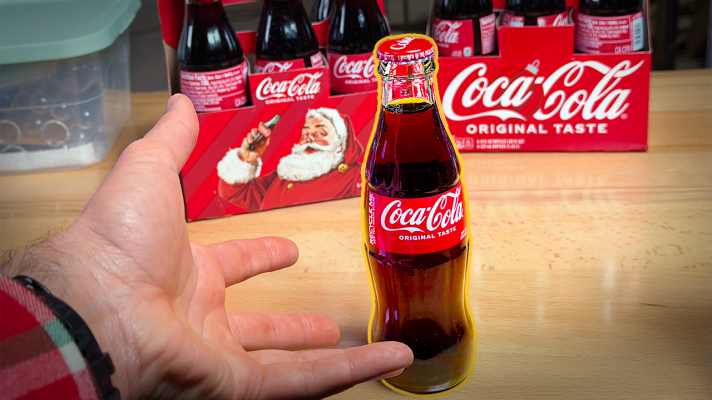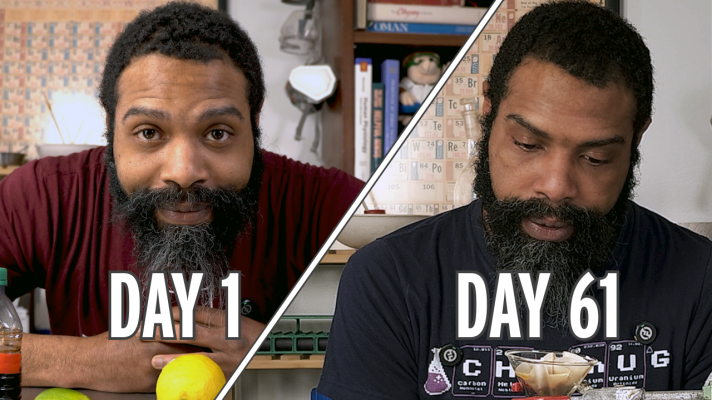Latest Episodes
All
-
All
-
Reactions Season 12
-
Reactions Season 11
-
Reactions Season 10
-
Reactions Season 9
-
Reactions Season 8
-
Reactions Season 7
-
Reactions Season 6
-
Reactions Season 5
-
Reactions Season 4
-
Reactions Season 3
-
Reactions Season 2
-
Reactions Season 1
George visits chemists and discovers that Mexican Coke is doing something secretive.
Episode:
S12
E1
|
14:19
While it looks easy on paper to make citric acid at home, Chem Thug runs into some pitfalls.
Episode:
S11
E13
|
16:29
We test if DNA from strawberries and salmon can really make fabric flame resistant.
Episode:
S11
E12
|
8:34
Are there really microplastics in chewing gum? George tries to find out.
Episode:
S11
E11
|
15:15
George tries to make a new discovery in a huge field of science... and he might have.
Episode:
S11
E9
|
11:15
This week Alex takes to the lab and investigates the stable isotopes in 20 different honeys.
Episode:
S11
E8
|
12:00
Rubbing two balloons together leads George to a shocking discovery.
Episode:
S11
E7
|
20:29
Is baking soda a legal, performance enhancing drug?
Episode:
S11
E6
|
11:25
George tries to make electricity using dialysis tubing, toilet parts, and a baby turbine.
Episode:
S11
E5
|
8:10
Alex wonders what happens when hot water freezes quicker than room temperature water?
Episode:
S11
E4
|
13:59
Could a seemingly magical 300-year-old technology save us from climate change?
Episode:
S11
E3
|
9:56
Fluoride is everywhere in the discourse but here’s what the research actually says.
Episode:
S11
E2
|
14:50
How does a lifesaving drug vanish into thin air?
Episode:
S11
E1
|
9:47
is there really a difference in the Coca-Cola from Mexico?
Episode:
S10
E16
|
9:36
Alex made some kidney stones at home and tested prevention methods to keep them at bay.
Episode:
S10
E15
|
11:57
An email from a subscriber made us question everything we thought we knew about trees.
Episode:
S10
E14
|
10:38
The 15 ways that color happens. It's all about the electrons. Well, almost.
Episode:
S10
E13
|
21:33
This element powers glow in the dark exit signs, keychains, and costs $30,000 per gram.
Episode:
S10
E12
|
12:07
Scientific fraud rocked the Alzheimer’s research community. Did it help point to a cure?
Episode:
S10
E11
|
9:53
Alex Dainis explores whether or not your milk needs to be pasteurized. Yes, it really does.
Episode:
S10
E10
|
12:54
George tests a revolutionary new way to stick stuff together.
Episode:
S10
E9
|
14:04
Sometimes the difference between life-saving drug and deadly side effect is chirality.
Episode:
S10
E8
|
12:02
What happens when you eat morel mushrooms.
Episode:
S10
E7
|
17:23
WARNING: this video contains incredible macro footage of supercooled water droplets nucleating ice.
Episode:
S10
E6
|
10:31
Let’s dive into the science behind ocean alkalinization!
Episode:
S10
E5
|
13:12
Discover why curdled milk is the key to the best cocktail you’ll ever taste.
Episode:
S10
E4
|
16:56
Scientists are finding the building blocks of carbon ring structures… out in space!
Episode:
S10
E3
|
10:13
George becomes a pyromaniac to figure out if ammonia is the fuel of the future.
Episode:
S10
E2
|
12:00
Counterfeit detection pens use a starch-iodine reaction. We fool them using chemistry!
Episode:
S10
E1
|
10:20
Why Alex is terrified of antibiotic resistance, and what chemists are doing about it
Episode:
S9
E17
|
13:06
Are liquid, virtually fireproof, recyclable batteries the future of grid-scale storage?
Episode:
S9
E16
|
9:01
Join George as he hunts for an antidote to deadly mushrooms.
Episode:
S9
E15
|
11:39
George tests a newly discovered technique that could solve a recycling problem.
Episode:
S9
E14
|
12:15
How does lime juice turn raw fish into delicious ceviche? We explain with biochemistry!
Episode:
S9
E13
|
11:46
Forever Chemicals last… forever. Can a new technology finally send them to their doom?
Episode:
S9
E12
|
10:31
Reducing the carbon footprint of concrete and cement by relying on biology.
Episode:
S9
E11
|
8:21
Mosquitos really do prefer some people over others, and this Reactions ep explains why!
Episode:
S9
E10
|
9:13
Discover the single most important chemical reaction on Earth, and why we need to kill it.
Episode:
S9
E9
|
13:50
This week Reactions dives into something truly out-of-this-world: amorphous ice.
Episode:
S9
E8
|
9:38
Extras
Get ready to kick back and relax by the fire this holiday season!
Special:
4:11:33
Look into the chemistry behind deep fried turkey for your Thanksgiving dinner.
Special:
2:57












































